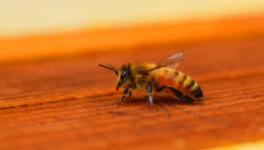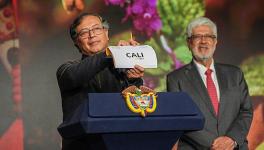Test More People for Covid-19, Says Top Scientist

Representational image. | Image Courtesy: flicker
Leading biologist Prof Satyajit Mayor, who is presently the director of the National Centre for Biological Sciences warns that more viruses will seek human targets if Earth’s biodiversity is not protected. He also says that the Covid-19 pandemic has got the world to reduce harmful emissions. This means that we can rethink our lifestyle for the sake of the world. He talks to Rashme Sehgal in an exclusive interview.
There is increasing loss of biodiversity on our planet. Does fewer animals, plants and microscopic organisms mean fewer humans too?
I completely agree. As a species we are not distinct from other animals, in that we cannot forget that we are deeply connected to the rest of the ecosystem. It should be clear to all that we humans will not be there [either] if we destroy our natural habitat. We must understand the perilousness of our actions because we cannot forget that we are part of a larger system. Nor can we forget that we are subject to the same rules that nature displays with every other organism on the planet.
Has it been clearly established that this loss of biodiversity is closely linked to an increase of zoonotic diseases?
This realisation has been made clear to us with this onset of Covid-19, because the smallest of creatures of the natural system has brought us to a grinding halt. We cannot forget that a virus can affect all beings, be they plants, an elephant or a human being. We are pushing so many of our fellow creatures into oblivion—and when this happens viruses are going to look for other places [including human beings].
Viruses and other pathogens are likely to move from animals to humans as a result. There is the Novel Coronavirus today, but many other viruses have caused infections in a similar manner. Some other pathogens have not caused such symptoms, but just look at the number of fevers there are [today] which are of unknown origin.
Our existence is very close to our ecosystem; and the ecosystem will keep throwing new challenges at us. That is the language of nature and the current epidemic must be seen in this context. It is also important to emphasise that technology is always one step behind nature.
So if India is losing 333 acres of forest land every day, as is said, then what could be the consequences and how do they come into operation?
When we start fragmenting habitats; for example if a large forest gets fragmented, then the surface area of interaction between humans and animals in this smaller domain will increase. That increases the chance of disease. The Novel Coronavirus is causing misery, but it has also caused emission levels to be reduced globally. [So] it has succeeded in doing what the Kyoto Agreement of 1997 and the Paris Agreement of 2019 on climate change failed to achieve all these years. This means that human beings can change if there is some kind of a shake-up. We need to learn some lessons from this terrible epidemic.
We need to take firm decisions at multiple levels, be at the government, policy-makers, and individuals, to ensure that we reverse the processes that are destroying our habitats. We have to get rid of the notion that if we humans can get rid of other forms of life, we will be safe forever.
The disease ecologist Thomas Gillespie has said that the majority of pathogens are yet to be discovered. What are the implications of this?
Yes indeed, viruses are of many kinds and they inhabit every creature on the planet.
We are seeing a daily spike in the number of infections caused by the Novel Coronavirus. What are the learnings so far?
Our strategy to test remains symptomatic rather than asymptomatic. We need to test a broader population. In Gujarat, according to newspaper reports, two cases were found suffering from Covid-19 in Bhavnagar, who were apparently not in contact with infected patients. We need to hear from health authorities in Bhavnagar as to how they got infected.
This is a question that needs to be addressed. We need to be extra vigilant over this. A serious assessment needs to be done because although the testing [facilities] have been increased from 20 to 120 labs, we all need to know just how the disease is progressing.
Several medical specialists, both in India and abroad, are questioning the need for this drastic lockdown. They feel a hysteria has been created over this pandemic and that pharma lobbies are behind this. These doctors cite the example of how two million Indians are getting tuberculosis every year, but there is little media focus on this disease. What are your views?
In the main, Covid-19 remains asymptomatic. For every one who is found to be infected, there are several others who are carrying this infection. We can look at this problem in two ways. If we allow completely unfettered transmission of the virus, without any mitigation, the chances are that like in Italy, we will see 10 to 15 per cent of our elderly developing severe symptoms. This will comprise a huge number and I don’t think that any reasonable state can afford such large numbers. Our health system will not be able to cope with even providing respirators for such a large population of the elderly, even if it is required for a period of one to two weeks.
Measures such as lockdown need to be taken. What would be the cost if 10 per cent of our aged go on to develop symptoms of Covid-19? If we have around 200 million aged people, 10 per cent works out to twenty million. Then we are in a very serious condition. The entire country would come to a standstill.
It is for this reason that a lockdown and other measures have had to be taken. The government is trying to slow down the spread of the disease. It is a question of putting up one against the other. Of course, there are questions about why tuberculosis, which is a preventable disease, has not been prevented so far. This is a question that we need to ask.
When our governments and corporations know that our present lifestyle is unsustainable and needs to be changed, why is nothing done on this score?
I think there is a view, [that] if we stop this lifestyle, the world will stop. Human beings believe technology can circumvent the problem of their being [just] one more [of many] species on the planet and that we have no relationship with the rest of the planet. But as I said, technology will always be one step behind.
Scientists have been warning of this repeatedly. There is a strong body of evidence created by scientists working on climate change; but is it enough?
These arguments have not been made just now. Alexander von Humboldt, the famous German geographer, made these observations in the 18th Century. He wrote about the loss of biodiversity and how agriculture along the Amazon river was destroying the natural habitat of that region. He also argued that settled agriculture had not brought about freedom from disease. Clearly, thanks to modern medicine, we are leading longer and healthier lives, but this comes as a consequence to the planet.
As a biologist, I can only say I am deeply, deeply concerned. It is in this context that we have set up a National Mission for Biodiversity and Human Well-Being, which is an attempt to bring biodiversity and conservation to the forefront of Indian science, policy and society’s attention. Hopefully we will be able to put in place a means to protect biodiversity. People need to be scientifically informed and scientific data to assess what kind of policy decisions need to be taken.
For example, shrinking biodiversity has led to a decline in the insect population. This will affect pollination, because our ability to produce food depends on pollination. If this declines, the rug will be pulled from under our feet. This is not about just insects but all forms of life.
Rashme Sehgal is a freelance journalist.
Get the latest reports & analysis with people's perspective on Protests, movements & deep analytical videos, discussions of the current affairs in your Telegram app. Subscribe to NewsClick's Telegram channel & get Real-Time updates on stories, as they get published on our website.
























